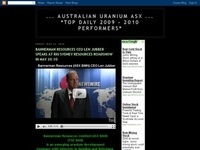Published on Tuesday Oct 12 2010

BRISBANE -(Dow Jones)- Australia's resistance to a domestic nuclear power industry risks leaving the country vulnerable if the world agrees to greenhouse gas emission targets, the head of Canberra's nuclear power body said Tuesday.
Ziggy Switkowski, chairman of the Australian Nuclear Science and Technology Organisation, said the country's current dependence on fossil fuels would leave it exposed if carbon emissions targets are agreed to.
"This is a national vulnerability. If the world moves to clean energy, then what's been a source of competitive advantage for Australia--low-cost fossil fuels--will become a competitive disadvantage," he told a conference in Brisbane.
Australia is home to around 38% of the world's uranium reserves and two of the world's three biggest uranium mines--BHP Billiton Ltd.'s (BHP) Olympic Dam mine and Energy Resources of Australia's (ERA.AU) Ranger mine.
However, it was alone among the world's 28 largest economies in not considering nuclear power as part of a future energy and climate change policy, Switkowski said.
The country's only working nuclear reactor, at Lucas Heights near Sydney, produces medical isotopes.
Around 90% of Australia's electricity is generated from fossil fuels, principally coal, and establishing a nuclear industry would be essential to breaking that pattern, he told Dow Jones Newswires.
"We're just about the highest per capita greenhouse gas emitters in the world, and we are publicly committed to massive greenhouse gas reduction targets.
"But I don't see how we're going to get there without nuclear power in the narrative. I can't make the numbers work."
He suggested that ten 1,000-megawatt reactors could be built by 2050 to deliver a quarter of the country's energy needs, built on the location of existing fossil fuel stations because of their good grid connections, water supply, and the absence of local communities.
However, the result of recent federal elections, after which the Labor government holds power thanks to the support of a Green party MP and three independents, has made the prospects of change more remote, he said.
The Greens are publicly opposed to nuclear power, and two of the three independents have a record of opposition to the nuclear industry.
"I think the election outcome has, if anything, slowed or tempered any enthusiasm for nuclear power at the policy level for some time," he said.
At the same conference, Tsunehisa Katsumata, chairman of Tokyo Electric Power Co. (9501.TO), one of Japan's largest power utilities, said Australia was more suited to nuclear power than his own country.
"You have lots of land where people don't live. You don't have earthquake issues because you have solid geology," he said. "But it is difficult to convince your community on the basis of energy security," since the country has such abundant energy supplies, "and also fossil fuel power generation is very low cost, so it is very difficult for nuclear to compete."
Tepco operates 17 nuclear reactors in Japan, accounting for 40% of the company's electricity output. Its Kashiwazaki-Kariwa plant is the world's largest-capacity reactor.
Visit my other site Australian Uranium Investing
 Australian Uranium News - Research
Australian Uranium News - Research

No comments:
Post a Comment